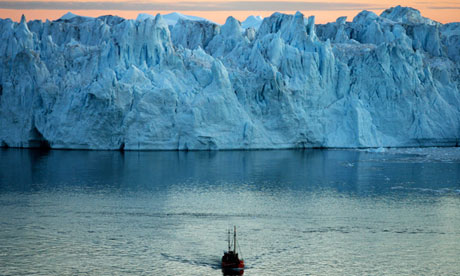
The Science Museum has published its first ever work of fiction, a novel by its former writer-in-residence Tony White that was inspired by a lost fragment by one of the members of Robert Falcon Scott's ill-fated 1911 Antarctic expedition – one of the earliest tales ever to mention climate change.
White, a critically acclaimed novelist, was researching the expedition when he stumbled across the fragments of a story by George Clarke Simpson written for the "South Polar Times", the homemade newspaper that was passed around on Scott's journey to the south pole. "Most of the writing in the South Polar Times is scientific descriptions of expeditions and experiments, but hidden among these is a small number of particularly fascinating short stories," said White. "The Simpson story is inspired by their discovery of geological evidence of past climate change – he's trying to come to terms with this and it's so interesting for me as a novelist that the first thing he did was to write a story."
"I know not why I write for there will be none to read; but the history of the human race since the dawn of civilisation has been written, and I feel impelled to set down the manner of the end," wrote Simpson, who went on to become an atmospheric scientist and the longest-serving director of the Met Office. "The great question of the day was, Does climate change? The greatest authority, the Physiographer of the Expedition 1910-12 was quoted. He took for granted that ice age succeeded tropical age, and tropical age succeeded ice age ... I, the writer of this record, am the last of the race, and soon I must follow the companions who have lived with me through the many centuries since the Elixir was discovered. My dying thoughts are of the folly which neglected the teachings of the Scientists of the British Antarctic Expedition 1910-12."
Simpson's use of the words "climate change" was "very early", said White. "He's talking about industrialisation, he's interested in the melting and freezing in the Antarctic, and its impact, [imagining it] destroying the human race ... We often forget that people survived that expedition, but he survived, and continued to research climate change for the rest of his career."
White called his discovery amid the Scott papers "a bit of a gift to a writer"; it went on to inspire his novel Shackleton's Man Goes South, which explores how climate change could affect the world today – its political, social and cultural impacts. "I've flipped the polarity of the Shackleton story and made it a desperate journey in a hot world – an escape to Antarctica rather than from it," he said.
The novel is the first work of fiction the Science Museum has ever published, and visitors to the Atmosphere gallery – a new, year-long display charting the scientific and literary inspiration behind the novel – will be able to download a free copy of the book. It is also free from the Museum's website, with a limited edition paperback in the museum's shop.
White, author of the novel Foxy-T, which was published by Faber & Faber, is known for his experimentation – he wrote a novella, Dicky Star and the Garden Rule, to accompany a series of works by the artists Jane and Louise Wilson marking the 25th anniversary of the Chernobyl disaster, and is also the author of Ivy4evr, an SMS-based, interactive drama for young people broadcast by Channel 4 in October.
"Everything in publishing is changing so much, and everyone in the book trade is looking for new ways to reach readers. For me to be able to work with an institution of the scale of the Science Museum is like collaborating with a small town – and the footfall they have is huge," said White. "I wanted to experiment to see what I could do with that … this just feels like a good way of testing the water."

